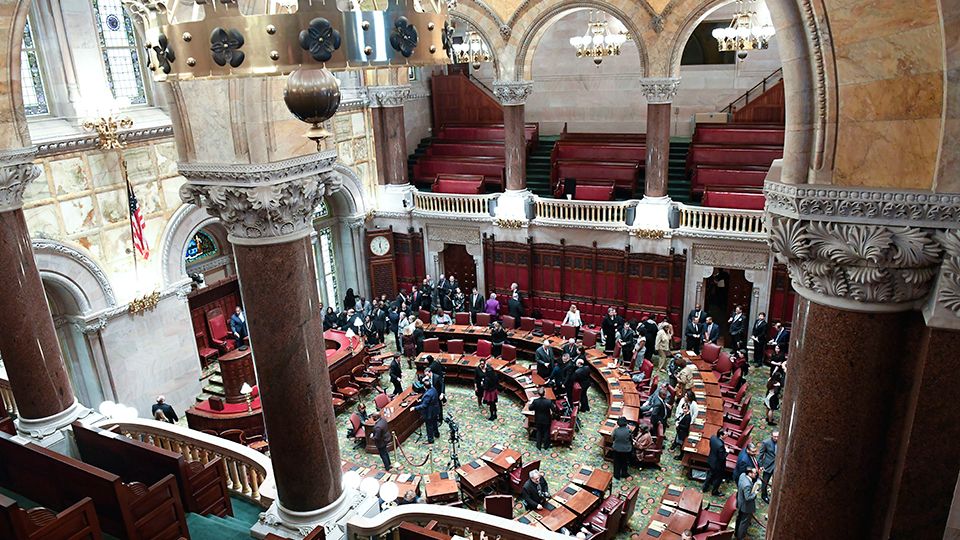For more than a few years, the idea New York state would legalize marijuana was nearly laughed out of Albany. It easily passed last month.
The idea that solitary confinement in New York's state prisons would somehow be curtailed did not have the slick backing of well-polished lobbyists, but the formerly incarcerated people who lived the experience. That bill got done this year, too.
And now lawmakers are on the cusp of approving a finalized $212 billion spending plan that will super charge school funding, provide aid to undocumented people affected by the pandemic and hike taxes on the rich to pay for it all.
"Thanks to the state's strong fiscal management and relentless pursuit to secure the federal support that the pandemic demanded, we not only balanced our budget, we are also making historic investments to reimagine, rebuild and renew New York in the aftermath of the worst health and economic crisis in a century," Cuomo said in a statement.
In political theory, there's something called an Overton window, an idea that slowly enters the mainstream as the window gets bigger and bigger. The window opened wide this year for Albany.
The budget in many respects stands in stark contrast to the one Cuomo first pushed for in 2011, when he sought to cap spending overall, and tangled with the state's progressive organizations. At the time, Cuomo was embracing the accepted wisdom: A recession meant New York had to throttle back.
Ten years later, politics has changed; the approach to a recession has changed for Democrats who now grasp all levers of power in state government.
Democrats hold supermajorities in the state Assembly and state Senate, and while that may matter less in the practical implications of the budget, the last three months have showed the party, and its progressive wing of relatively recently elected lawmakers, are more than willing to use their power to get what they want done.
The budget is a capstone to the last three or so months of a pandemic, a governor under fire amid a series of escalating scandals and controversies and yet another subtle sign power has shifted at the state Capitol.
Cuomo has often defined the art of dealing making as essentially making sure perfect isn't the enemy of the good. Progressives were not able to get everything they wanted: The excluded workers fund, for instance, is about $1.5 billion less than advocates had called for at the start of the year.
“Workers denied recognition of their basic worth for more than a year today celebrate a victory that will reverberate across the state and the country, after the New York State legislature and Governor Cuomo agreed to a budget establishing a $2.1 billion excluded workers fund," said Bianca Guerrero, a coordinator for the effort. "This fund will finally provide relief to hundreds of thousands of workers across New York State who had previously been excluded from every single form of federal or state income support."
But the budget, as well as the legislation heading to Cuomo's desk as standalone bills, are reflective of a party now firmly in charge, even as there is fraying around the corners.
Democrats like Assemblyman Tom Abinanti feuded with progressives over the details of the budget, including the excluded workers fund. State Democratic Chairman Jay Jacobs inserted himself into the drama by insisting such opposition is not rooted in racism.
Assemblywoman Carrie Woerner, a Democrat who represents a district north of Albany, said she would not support the fund, either.
“Families in Saratoga and Washington Counties are still struggling in the wake of the COVID-19 pandemic," she said. "Every day I hear from constituents who have lost their jobs or have been forced to close their businesses."
Amid it all is an embattled governor who, quite literally, refuses to quit.
Cuomo did not enter the budget fray much this year. Often during these negotiations, he is quite literally the man behind the curtain to achieve the outcome he wants.
Less than a month ago, the Assembly was moving toward an impeachment investigation, Democrats at all levels of government were calling for his resignation.
He has been accused of sexual harassment or inappropriate behavior by multiple women. His administration is under investigation over how it handled nursing home fatality data during the pandemic. His book deal about the crisis was reportedly worth about $4 million. Those close to him, including members of his family, received preferential access to COVID tests last year when supplies were scarce.
Access to the governor for the press is now limited to four questions on a conference call in which reporters are handpicked by his staff. He holds events closed to the general public featuring allies lavishing praise on him.
Who knew the state budget, arguably the heaviest lift and most consequential thing New York does every year for its 19 million residents, would be a (temporary) reprieve?



